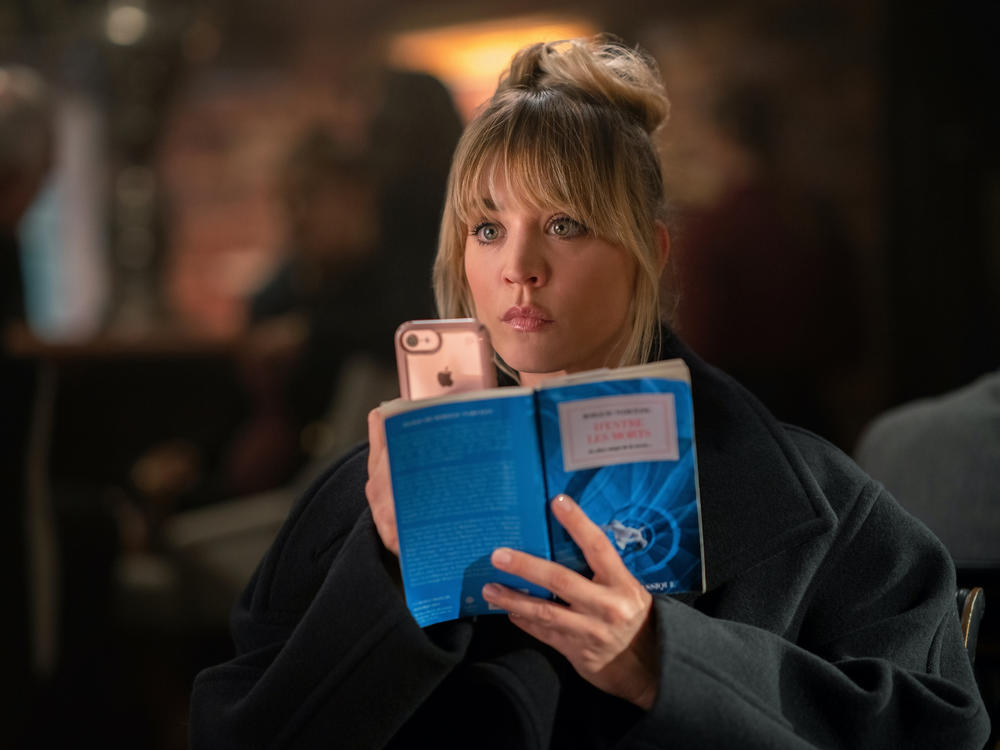Section Branding
Header Content
In its second season, 'The Flight Attendant' charts a new course — and it works
Primary Content
This review contains spoilers for the first season of The Flight Attendant.
I loved the first season of The Flight Attendant on HBO Max.
Based on Chris Bohjalian's book, it starred Kaley Cuoco as Cassie, the titular flight attendant who woke up one morning after a wild night of partying and found a dead guy in bed with her. She spent the rest of the season not just trying to figure out what happened, but wrestling with her addiction to alcohol, the trauma in her past, and her troubled relationships with her best friend and her brother.
But the show played fair in a very particular way: It didn't dodge resolving the story in order to preserve the ability to do a second season. You got to find out what happened and who did what, you got to find out how it turned out for Cassie, and you got to see Cassie make at least some progress on her personal stuff.
But it got that second season, thankfully, and that left open the question: Now what?
When we dive into the second season, the first two episodes of which are now streaming on HBO Max, we find Cassie a changed woman. She explains straightaway, in her A.A. meeting, that she lives in L.A. now, she's been sober for a year, she's dating a hot guy named Marco, and while she's still a flight attendant, she also has a second job. She does not specify to the group what the second job is, but it turns out she's now working as a CIA asset, a direct result of the events of the first season. That role is useful for TV purposes, since working with the CIA allows Cassie to end up in an entirely new season-two mess without it appearing like dumb luck that this one flight attendant gets into two separate messes, one after the other.
One of the challenges the show faced this year, though, is how — and, indeed, whether — to continue with the elements of unreality that marked the first season and, in part, made it so interesting. Specifically, the show dramatized Cassie's internal struggles by using fantasy sequences in which she, in her "mind palace," had long conversations with a vision of Alex (Michiel Huisman), the dead guy from her bed. With Alex's story over, who does Cassie talk to now? Where's the mind palace now?
It turns out the answer is that Cassie is stuck with herself. This season's mind palace finds Cuoco playing several different versions of Cassie who talk and argue inside the partially destroyed lobby and bar of a glitzy hotel, which makes a visually effective setting for the inventory she takes of her flashy self, her quieter self, her younger self, and so forth. And while she worked out a lot of things last season, nothing is that easy. Cassie's most important personal relationships continue to be with her best friend Annie (Zosia Mamet) and Annie's boyfriend Max (Deniz Akdeniz), but those bonds have always been strained by the fact that Cassie has long been an exhausting person to love, and even now, as she seems to be doing better, there is a wariness on the part of her loved ones about the fragility of her sobriety.
Speaking of her loved ones: Rosie Perez is back as Megan, Cassie's friend who turned out to be deeply in trouble herself (I will let you find out what her current status is), and T.R. Knight as her brother, Davey. New additions to the cast include Mo McRae as Benjamin, Cassie's C.I.A. handler, and Cheryl Hines as his boss; Shohreh Aghdashloo as Cassie's A.A. sponsor; Mae Martin as Grace, one of Cassie's fellow flight attendants; and Margaret Cho in a role I don't want to say much about. Sharon Stone also shows up a bit later in the season as Cassie's mother, which is a brilliant piece of casting that makes perfect sense as soon as you see it.
It's very common for series to launch now with little certainty as to how long they might run. What to do about the end of a first season can be confounding. Severance is a recent example of an exceptional show that played a very dangerous game by ending its first season on a cliffhanger that would have been enraging had Apple not greenlit a second season — which, thankfully, it did.
But there are other shows, like Big Little Lies, that came back for second seasons without a clear creative purpose other than continuation itself. The Flight Attendant is an example of how a show with strong undercurrents of genre fiction — think about the many, many spy novel series that have gone on and on — can escape those second-season blues by leveraging the natural occurrence of a new story. A spy, after all, will get in jam after jam. Bridgerton is the same way, really, as an adaptation of a romance series that follows connected characters through their own love stories.
But the end result is that a show like this can come back and be satisfying, again and again, without either gambling on a cliffhanger or having to start entirely from scratch. And this season of The Flight Attendant, anchored by Cuoco's outstanding work, manages that feat gracefully.
This essay first appeared in NPR's Pop Culture Happy Hour newsletter. Sign up for the newsletter so you don't miss the next one, plus get weekly recommendations on what's making us happy.
Copyright 2022 NPR. To see more, visit https://www.npr.org.
Bottom Content

